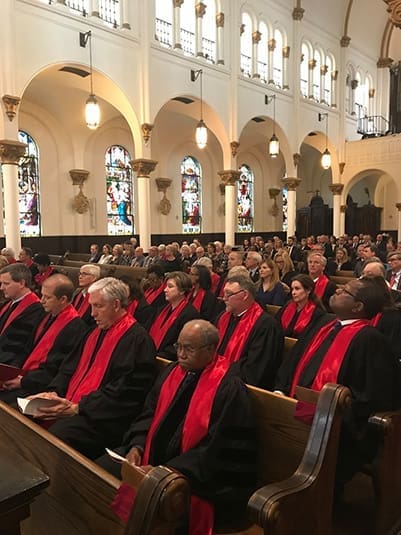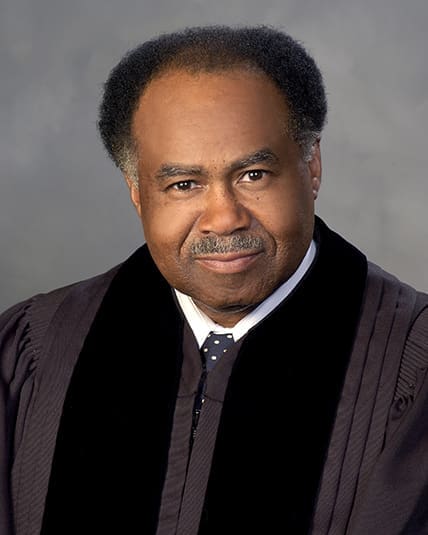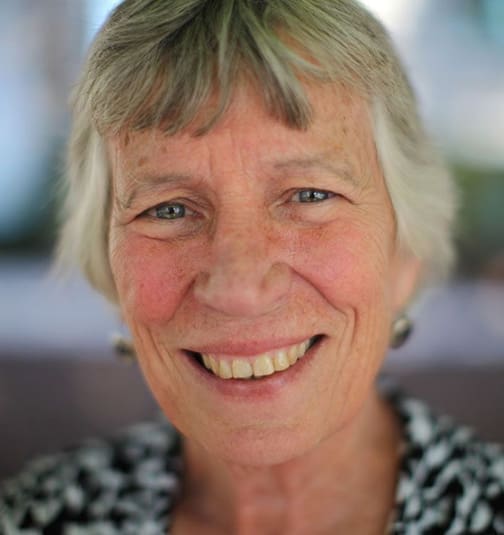Atlanta
Georgia justice, disability rights advocate named St. Thomas More Award recipients
Published October 18, 2019

Atlanta’s legal community gathered for the annual Red Mass, Oct. 10, at the Basilica of the Sacred Heart. Photo By Tatiana Villa
ATLANTA—Judges, lawyers, law students and other legal professionals attended he St. Thomas More Society’s annual Red Mass Oct. 10 at the Basilica of the Sacred Heart of Jesus.
Father Daniel Ketter, judicial vicar of the Metropolitan Tribunal of the Archdiocese of Atlanta, was the celebrant. Deacon Michael Byrne was the homilist.
The annual Mass celebrates the beginning of a new judicial year. The St. Thomas More Society held a luncheon afterward honoring winners of its St. Francis of Assisi Award and St. Thomas More Awards.
Chief Louis Dekmar of LaGrange was honored with the St. Francis of Assisi Award. Recipients of this year’s St. Thomas More Awards were Georgia Supreme Court Justice Robert Benham and Susan C. Jamieson, founder of the Mental Health and Disability Rights Project at the Atlanta Legal Aid Society.
Justice Robert Benham
Georgia Supreme Court Justice Robert Benham was honored with the St. Thomas More Award for leadership in promoting and raising professionalism among Georgia’s lawyers especially since his election as Chief Justice in 1995.
As Chief Justice, Justice Benham led the effort to expand the definition of professionalism beyond merely promoting civility between advocates. It has now become an umbrella concept and structure with essential elements and values.
Even before his appointment to the Supreme Court, Justice Benham recognized that the Georgia Bar’s focus on the single aspect of civility in the definition of “professionalism” produced too narrow a view of the problem, ignoring other facets that could offer great advantages to the Bar and, more important, to the public.

Justice Robert Benham
Under his leadership, the professionalism movement in Georgia has spawned commissions appointed by the Supreme Court of Georgia: The Commission on Equality and the Commission on Dispute Resolution. The Community Service Task Force was created under the auspices of the Commission on Professionalism to bring an expanded focus to the community and public service aspects of professionalism. Through its Committee on the Standards of the Profession, the State Bar of Georgia has joined with the commission in designing and conducting a Transition into Practice Pilot Program to test the feasibility of requiring newly admitted lawyers to complete a skills and values curriculum linked with mentoring by experienced lawyers. As a joint effort of the Georgia Supreme Court and Bar, the commission works with the Law Practice Management, Lawyer Assistance, Consumer Assistance, Diversity, and Pro Bono Programs of the State Bar and with the Office of Dispute Resolution. Each of these is effectively dealing with subjects of professionalism.
Justice Robert Benham is the longest-serving member of the Supreme Court of Georgia. Appointed by Governor Joe Frank Harris in December 1989, he was the first African American ever appointed to the state’s Supreme Court in its over 140 years. In 1990, Justice Benham won statewide election to a full term on the Court. He served as Chief Justice from 1995-2001, elected by his peers. Before his appointment to the Supreme Court, Justice Benham had served on the Georgia Court of Appeals for five years.
Justice Benham was born in Cartersville. He obtained a bachelor’s degree in political science from Tuskegee University and also attended Harvard University. In 1970 he earned his Juris Doctor from the University of Georgia, Lumpkin School of Law. He was awarded a Master of Laws degree from the University of Virginia in 1989.
After completing law school, Justice Benham served in the U.S. Army Reserve. He then served briefly as a trial attorney for the Atlanta Legal Aid Society, Inc. He returned to Cartersville, where he was in private practice. He served as Special Assistant Attorney General.
Justice Benham is a member of several judicial and legal foundations and associations.
He is married to the former Nell Dodson, and they have two sons. An avid woodworker, Justice Benham enjoys spending time with his sons, making wooden toys and music boxes.
Susan C. Jamieson
This year marks the 25th anniversary of the case that has been called the “Brown v. Board of Education” in establishing rights for the mentally disabled—the Supreme Court’s 1999 decision in “Olmstead v. L.C.”

Susan Jamieson
NPR Photo/John W. Poole
Susan C. Jamieson, the founder and former director of the Mental Health and Disability Rights Project at Atlanta Legal Aid Society (now known as the Disability Integration Project), is the driving force behind that landmark achievement. Jamieson was honored by the St. Thomas More Society with a St. Thomas More Award.
A primary focus of Jamieson’s legal career has been protecting the rights of disabled persons in institutions. In the late 1970s as a Legal Aid lawyer in Jacksonville, Florida, she began visiting a state hospital to help clients with common legal issues such as divorce. She saw that these persons were isolated not only from society in general, but also from representation by the legal community. Jamieson became troubled by restrictions on their liberty.
She joined the Atlanta Legal Aid Society in 1985 and began working with clients at Georgia Regional Hospital. There, she came to meet Lois Curtis and Elaine Wilson, who were the plaintiffs in the Olmstead case. Both were mentally disabled, and despite ultimately being found eligible for community placement, remained institutionalized.
Jamieson and her Atlanta Legal Aid colleagues filed an action alleging that the state’s institutionalization of these women violated Title II of the Americans with Disabilities Act. The case was assigned to late U.S. District Court Judge Marvin Shoob, who granted partial summary judgment to plaintiffs. Judge Shoob held that “unnecessary institutional segregation of the disabled constitutes discrimination per se, which cannot be justified by a lack of funding.”
The Eleventh Circuit affirmed in part, but remanded for reassessment of the State’s “cost-based” defense. In a resounding victory for Jamieson’s team, the Supreme Court affirmed in part.
“Olmstead” thus required public entities to place persons with disabilities who are in institutions in more integrated, community-based settings, if their clinicians agree and this is their choice. The decision recognizes the value of preserving the dignity and independence of these citizens.
Jamieson entered semi-retirement in 2009 and is co-director of the Disability Law Project at the Institute on Human Development and Disability at the University of Georgia.
The St. Thomas More Society, Inc. is a non-profit formed by a group of Catholic lawyers in Atlanta. To learn more, go to www.stm-atlanta.org. Read about Chief Louis Dekmar, the Red Mass honoree receiving the St. Francis of Assisi.